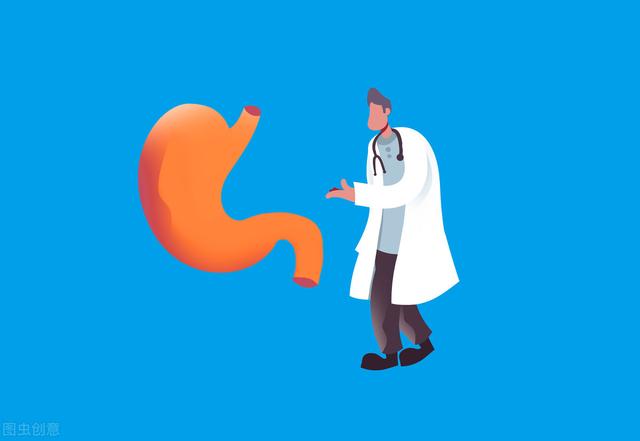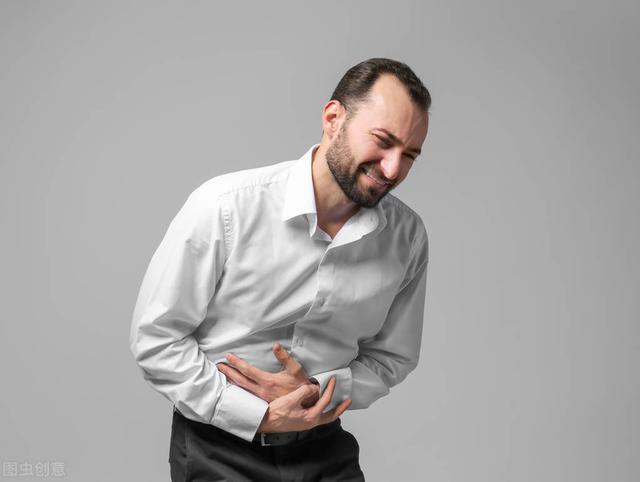What happens when diabetes causes stomach pain?
Diabetes mellitus is a complex metabolic disease that occurs mainly when the body does not produce enough insulin to restore the blood glucose in the blood, which is elevated by the intake of food, to normal levels or when this process of insulin lowering the blood glucose does not take place properly due to an obstacle in one way or another. It often leads to a variety of complications, including stomach pain. And there are three main reasons why diabetes causes stomach pain.
First, gastroparesis is caused by a neuropathy that squeezes the gastric nerve. This is because the neurons of the nervous system have been damaged to a certain extent by long-term high blood sugar, and are unable to understand and transmit the needs of digestion in the stomach and intestines, resulting in a lack of gastrointestinal power. Therefore, when the food in the stomach and intestines cannot be digested properly, it will inevitably cause compression of the gastric nerve, and then stomach pain will occur.
Secondly, because diabetic patients need to take long-term medication to lower blood sugar and other medications to treat diabetes. As the saying goes: it's the medicine that counts. Some drugs can play the effect of lowering blood sugar, but there will be some adverse reactions. Metformin, for example, after taking it, the phenomenon of gastric bloating will occur. Gastric bloating usually triggers gastrointestinal discomfort and lack of appetite, which also indicates that the drug has an impact on the digestive system of the stomach and intestines.
Thirdly, the influence of psychological pressure, sometimes our body's certain discomfort is caused by psychological pressure. Diabetic patients think that they are suffering from such a stubborn disease, this is a rich disease, it is difficult to cure, it will naturally produce psychological pressure, and in serious cases, it will also cause loss of appetite, inner anxiety and irritability. At this time, those small illnesses and pains will of course come uninvited. So it's not surprising that diabetes can cause stomach pain.
Instructor: Meng Yan, Chief Physician, Department of Gastroenterology, Jinzhou Central Hospital.
He specializes in the diagnosis and treatment of gastroenterological diseases such as gastrointestinal bleeding, gastrointestinal infections, gastroduodenal ulcers, and liver and gallbladder.
If you find this article useful, please feel free to like or recommend it to your friends and follow [Medlink Media].
I'm @CardiovascularMedicineGoldenfeld and I'm here to answer your question.
In addition to the familiar diabetic nephropathy, diabetic eye disease, diabetic cardiovascular disease, diabetes mellitus, it can also lead to gastroparesis. At this time, the peristalsis of the stomach slows down, the digestive function is reduced, and often vomiting and stomach upset.
Why do the above manifestations occur? Here, Dr. Gao will give you a closer look.

Why does diabetes cause stomach pain?
This is mainly due to long-term high blood sugar damage to the vegetative nerves, which leads to a lack of power of the gastrointestinal muscles innervated by the vegetative nerves, and then there will be a slowdown in gastric emptying, gastric distension and stomach pain, dyspepsia and other manifestations.
Normal gastric emptying is more than 50% of the gastric contents half an hour after a meal, about 80% of the gastric contents in 2 hours, and basically empties the gastric contents in 3 hours. However, when gastroparesis occurs, only about 40% and 60%-70% of the gastric contents can be emptied 1 hour and 3 hours after a meal.
Therefore, as long as the patient vomits food ingested 4 to 6 hours ago, it can indicate that the patient is experiencing symptoms of delayed gastric emptying.

How to Treat Diabetic Gastroparesis? These 3 points are crucial
(1) Rehydration of the body, electrolytes and fluid nutrients
Low-fat, low-fiber, less residue, fluid-based, small and frequent meals, the need for appropriate exercise after meals for 1 to 2 hours, to help gastric emptying.
Food should be in the form of small pellets or cubes. Studies have shown that patients who consume pellets or small pieces of food have significantly less bloating and abdominal pain.
(2) Drug therapy
Nutritional nerve drugs, antiemetic drugs and drugs to promote gastrointestinal peristalsis can relieve the condition, such as metoclopramide. Diabetic gastroparesis is acute and painful for the patient, but the symptoms can be greatly improved after drug treatment.
(3) Surgical treatment
Severe cases of gastroparesis usually require surgery. Implants, too, can help with gastroparesis.
I'm @cardiovascularmedicinegaoDengfeng, follow me, follow your health.
The most common clinical manifestation of diabetic neuropathy of the digestive system is gastroparesis, or paralysis of the stomach. Due to damage to the diabetic nerves that govern gastric motility, gastric peristalsis may be weakened, and the patient often feels fullness in the stomach after eating. The food in the stomach is not digested and retained in the lower part of the stomach, and there may be nausea and vomiting, acid reflux and flatulence.
The main clinical symptoms of diabetes do not include gastroparesis, and gastroparesis is not a specific symptom, as it can occur in a variety of diseases. Therefore, when diabetic patients develop stomach pain, they should be treated promptly to exclude stomach and other diseases, and then consider the association between diabetes and stomach pain. Depending on the course of diabetes, gastroparesis in diabetic patients may be associated with phytoneuropathy, drug reactions, ketoacidosis, and acute cardiac infarction.
First of all, long-term high blood sugar can cause damage to the vegetative nerves, the most common digestive symptoms when gastrointestinal insufficiency of power, thus causing gastroparesis and constipation. Secondly, Metformin, a common drug used to treat diabetes, may produce gastric distension in some patients after taking the drug. In addition, if the symptoms of diabetes are aggravated, acute complications of abdominal pain and nausea, such as ketonuric acidosis and acute cardiac infarction, can also occur, and all of these complications can present with symptoms of stomach pain.
Gastroparesis is not included inside the main clinical manifestations of diabetes. Gastrointestinal symptoms are also generally not required to diagnose diabetes. So this question is not universal. Gastroparesis is a very non-specific symptom that can occur in almost all diseases. If you analyze the development of diabetes and clinical experience, there are several possible scenarios in which a diabetic patient may experience stomach pain:
I. Gastroparesis caused by diabetic plant neuropathy. Long-term high blood sugar is a chronic damage to the nervous system, especially the vegetative nerve, the most common diabetic digestive symptoms are gastroparesis and constipation. All of them are caused by insufficient gastrointestinal power after visceral nerve damage.
Second, in addition to diabetic gastroparesis, some drugs for the treatment of diabetes mellitus can also have gastrointestinal reactions, such as the most commonly used metformin, many patients will have a feeling of gastric distension after taking the drug. Some other hypoglycemic drugs also have adverse reactions. However, these adverse reactions can be tolerated with the prolongation of the medication, unless it is very serious, it is generally not recommended to stop taking the medication.
Third, some acute complications of diabetes will also be abdominal pain, nausea as the main manifestation, such as diabetic ketoacidosis. Some diabetic patients are hospitalized for the first time because of ketoacidosis, before they do not know they have diabetes. Because of the inexperience of the receiving doctor, the direct infusion of glucose has led to the aggravation of the condition.
Fourth, diabetes mellitus if the disease duration is long, complications, can lead to acute myocardial infarction and uremia. Acute myocardial infarction many patients will have abdominal pain, nausea and vomiting performance, especially the lower wall myocardial infarction many will be confused with stomach pain. Uremic patients because they do not like to eat, abdominal distension and abdominal pain found in the clinic is not uncommon.
Diabetes-induced stomach pain, bloating and other indigestion symptoms are medically considered to be diabetic gastroparesis, one of the chronic complications of diabetes mellitus, which is clinically characterized by delayed gastric emptying.
The pathogenesis is considered to be related to a number of aspects such as poor glycemic control, autonomic neuropathy, abnormal secretion of gastrointestinal hormones, microvascular and gastrointestinal smooth muscle lesions, Helicobacter pylori infection and psychological factors. Clinical manifestations include nausea, belching, postprandial vomiting, abdominal distension, abdominal pain, poor appetite and other dyspeptic symptoms.
The first aspect of treatment is to start from diet, diet control is the basic core treatment to prevent and reduce the symptoms of gastroparesis. Recommended small amount of meals, low fat, low fiber diet; second is to control blood glucose, oral hypoglycemic drugs are not recommended, due to the characteristics of diabetic gastroparesis disease itself, oral drugs into the gastrointestinal tract can't be fully digested and absorbed or caused by delayed absorption, so that its pharmacokinetics change, appearing to reduce the therapeutic effect, and at the same time, oral hypoglycemic drugs have nausea, vomiting, abdominal distension, and other gastrointestinal side effects and aggravate the symptoms of gastroparesis. At the same time, oral hypoglycemic drugs mostly have gastrointestinal side effects such as nausea, vomiting and abdominal distension, which may aggravate the symptoms of gastroparesis.
This question and answer are from the site users, does not represent the position of the site, such as infringement, please contact the administrator to delete.